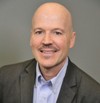On the final day of the M2M Business Exchange in Brussels the issue of mHealth was brought into focus in a number of presentations (*listed below) covering issues such as standardisation, reimbursement, user acceptance, mHealth communities and aiding healthcare in developing countries.
At the end of the session Chair, Marc Sauter, director of strategy at Cinterion Wireless, summarised the key points that had been raised and highlighted the challenges that need to be addressed.
He began, “The sessions offered a comprehensive and detailed overview of the mHealth market from a number of different angles. What is clear is that we have a complex eco-system and value chain in the healthcare market, which, as has been demonstrated throughout this conference, is reflected throughout the entire M2M market.
“A key issue is the standardisation process, which is crucial for the success of mobile health. But since the official standardisation is struggling the likelihood is that standards will increasingly be developed by companies. As was mentioned[1] Microsoft, Intel, General Electric and others are active here.”
Another issue raised was the channels for reimbursement for mHealth services with the example given that if a patient receives a service via telemonitoring there can be a different means of reimbursement from the health service or insurance company than if that patient had visited the doctor in person, although the service was comparable.
Sauter then maintained that the ease of use and functionality of devices will determine user acceptance. He said, “This is particularly pertinent in the mHealth sector where often the users are elderly people or very young people who are not familiar with the latest technologies. We have to take that into consideration when designing devices. Also, as has been said several times during this conference, with regards to user acceptance a question that always has to be asked is: can you trust the system?
Also discussed was the creation of mHealth communities in cities, regions and provinces whereby all the players work together to share data, share information and their experiences and create a unique, tailored service.
With regards to the development and implementation of mHealth technology he referred to a presentation[2], which raised a number of issues. These included defining the set of data that needs to be monitored. In particular it is crucial at the beginning to get this definition right in order to get the right diagnosis. Then there has to be acceptance of the device and the system, alongside data security and privacy and the definition of guidelines and processes on how to use and implement the technology. And as commercial companies developing systems and providing services need to make money, business cases need to be developed.
Sauter commented, “The M2M technology is there. We have cellular/platforms, mobile operators[3] say they have services in place and we have service providers offering services today. But we have to be more informative so that the end users and doctors know what to do with it.”
With regards to implementation, specific mHealth projects[4] are already in operation with encouraging results. Sauter commented, “Such projects show just what the potential is for mHealth and I think it should encourage us to go further down the line.”
He continued, “It was made clear in presentations that the eco-system will develop. The younger generation of doctors and patients will emerge that are used to playing around with iPhones and other devices, that will enable them to better adopt new technologies. New healthcare patterns will emerge.
“mHealth is not just about the health monitoring of patients but can also assist in healthier and more comfortable living[5]. It has a role to play in staying fit and can offer piece of mind too. Telemonitoring can also provide health information to doctors about patients in their own environment without the stress of travel, waiting in surgeries etc, and provide more accurate data, leading to better treatment.”
In a global context the issue of bringing better healthcare to developing countries was raised[6]. Examples were given whereby mobile phone services or applications of the phone can help to improve the healthcare situation. Here, GSM, GPRS and HSPA technologies are all being utilised for mHealth applications.
Summing up Sauter said, “The mHealth revolution is going to be very significant and a huge market. We all need to work hard to develop this market to its full potential.”
*Presentations
1. mHealth initiative – introducing the mHealth revolution and its impact on healthcare strategies, Peter Waegemann, executive director, mHealth Initiative
2. Examining the latest technology for monitoring the elderly, ill or disabled, Maurice Zembra, general manager, Medical Data Transfer
3. mHealth – new business perspectives for mobile operators, Marc Sauter, director of strategy, Cinterion Wireless
4. Understanding how Virga Jessa Hospital in Hasselt, in collaboration with Belgium Social Security has developed a monitoring strategy for patients with chronic diseases, Prof. Paul Dendale, cardiologist, Heart Centre Hasselt, Belgium
5. How can mobile technology support remote diagnostic measures and how can it support the boom of elders who want to prolong the good life at home?, Bjorn Tellefsen, director M2M, Devoteam Telecom
6. Examining Vodafone’s role in founding the mHealth initiative, Caroline Dewing, external relations, Vodafone Group
Richard Mumford
At the end of the session Chair, Marc Sauter, director of strategy at Cinterion Wireless, summarised the key points that had been raised and highlighted the challenges that need to be addressed.
He began, “The sessions offered a comprehensive and detailed overview of the mHealth market from a number of different angles. What is clear is that we have a complex eco-system and value chain in the healthcare market, which, as has been demonstrated throughout this conference, is reflected throughout the entire M2M market.
“A key issue is the standardisation process, which is crucial for the success of mobile health. But since the official standardisation is struggling the likelihood is that standards will increasingly be developed by companies. As was mentioned[1] Microsoft, Intel, General Electric and others are active here.”
Another issue raised was the channels for reimbursement for mHealth services with the example given that if a patient receives a service via telemonitoring there can be a different means of reimbursement from the health service or insurance company than if that patient had visited the doctor in person, although the service was comparable.
Sauter then maintained that the ease of use and functionality of devices will determine user acceptance. He said, “This is particularly pertinent in the mHealth sector where often the users are elderly people or very young people who are not familiar with the latest technologies. We have to take that into consideration when designing devices. Also, as has been said several times during this conference, with regards to user acceptance a question that always has to be asked is: can you trust the system?
Also discussed was the creation of mHealth communities in cities, regions and provinces whereby all the players work together to share data, share information and their experiences and create a unique, tailored service.
With regards to the development and implementation of mHealth technology he referred to a presentation[2], which raised a number of issues. These included defining the set of data that needs to be monitored. In particular it is crucial at the beginning to get this definition right in order to get the right diagnosis. Then there has to be acceptance of the device and the system, alongside data security and privacy and the definition of guidelines and processes on how to use and implement the technology. And as commercial companies developing systems and providing services need to make money, business cases need to be developed.
Sauter commented, “The M2M technology is there. We have cellular/platforms, mobile operators[3] say they have services in place and we have service providers offering services today. But we have to be more informative so that the end users and doctors know what to do with it.”
With regards to implementation, specific mHealth projects[4] are already in operation with encouraging results. Sauter commented, “Such projects show just what the potential is for mHealth and I think it should encourage us to go further down the line.”
He continued, “It was made clear in presentations that the eco-system will develop. The younger generation of doctors and patients will emerge that are used to playing around with iPhones and other devices, that will enable them to better adopt new technologies. New healthcare patterns will emerge.
“mHealth is not just about the health monitoring of patients but can also assist in healthier and more comfortable living[5]. It has a role to play in staying fit and can offer piece of mind too. Telemonitoring can also provide health information to doctors about patients in their own environment without the stress of travel, waiting in surgeries etc, and provide more accurate data, leading to better treatment.”
In a global context the issue of bringing better healthcare to developing countries was raised[6]. Examples were given whereby mobile phone services or applications of the phone can help to improve the healthcare situation. Here, GSM, GPRS and HSPA technologies are all being utilised for mHealth applications.
Summing up Sauter said, “The mHealth revolution is going to be very significant and a huge market. We all need to work hard to develop this market to its full potential.”
*Presentations
1. mHealth initiative – introducing the mHealth revolution and its impact on healthcare strategies, Peter Waegemann, executive director, mHealth Initiative
2. Examining the latest technology for monitoring the elderly, ill or disabled, Maurice Zembra, general manager, Medical Data Transfer
3. mHealth – new business perspectives for mobile operators, Marc Sauter, director of strategy, Cinterion Wireless
4. Understanding how Virga Jessa Hospital in Hasselt, in collaboration with Belgium Social Security has developed a monitoring strategy for patients with chronic diseases, Prof. Paul Dendale, cardiologist, Heart Centre Hasselt, Belgium
5. How can mobile technology support remote diagnostic measures and how can it support the boom of elders who want to prolong the good life at home?, Bjorn Tellefsen, director M2M, Devoteam Telecom
6. Examining Vodafone’s role in founding the mHealth initiative, Caroline Dewing, external relations, Vodafone Group
Richard Mumford


